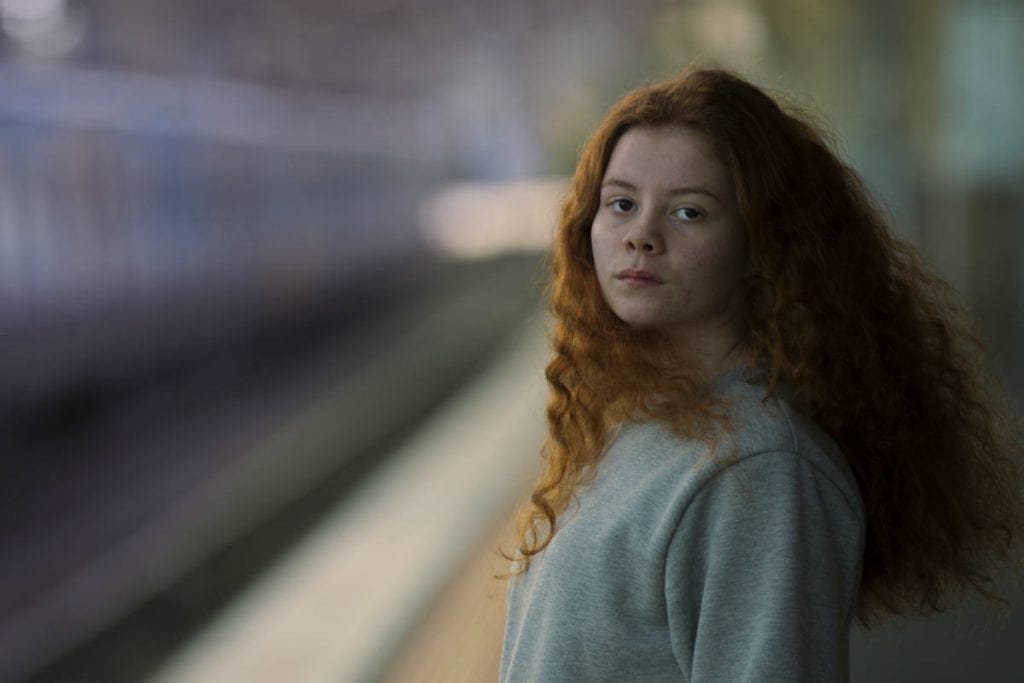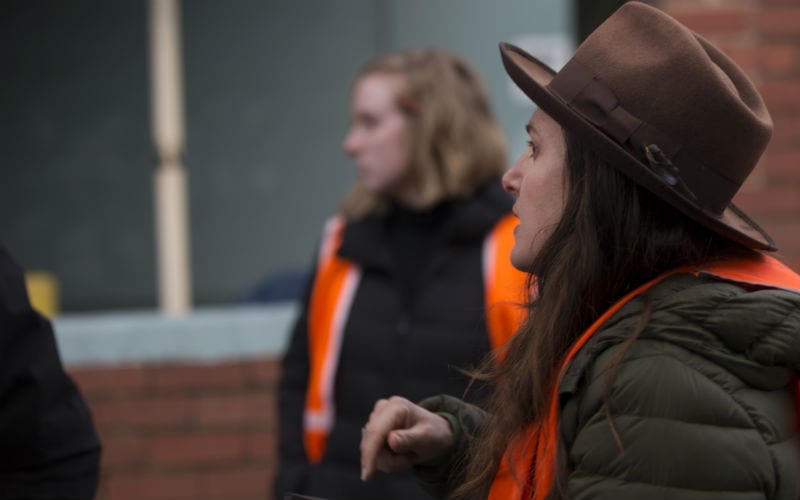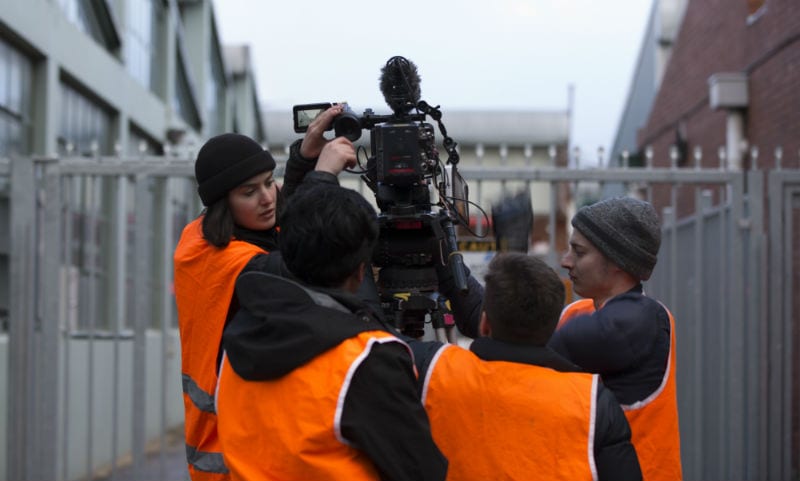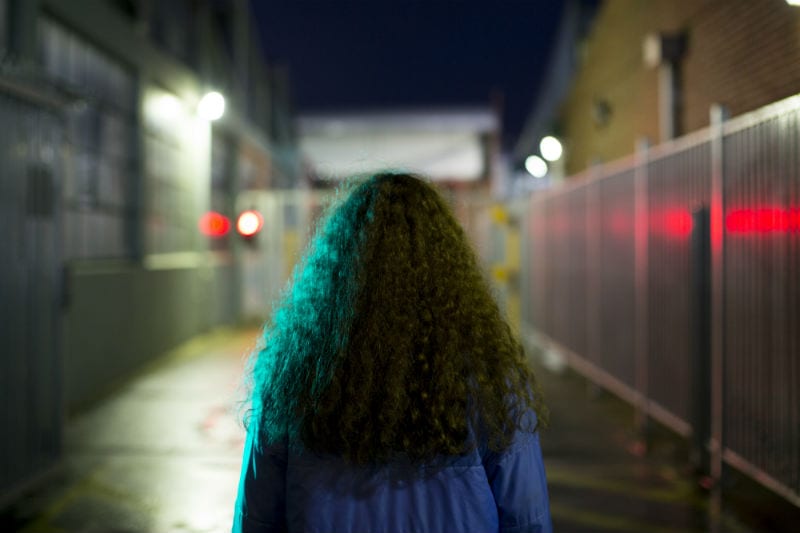VCA 2018 Graduate Film Series: Love is a Lunatic City

The annual Victorian College of the Arts Film and Television Graduate Screenings showcase the talent of our Film and Television students. We caught up with director Hannah Moore and producer Lauren Beck to talk about their film Love is a Lunatic City, screening at ACMI on Friday 7 and Saturday 15 December.
By Susanna Ling
Hannah Moore, director (Master of Film and Television, Narrative)
Lauren Beck, producer (Master of Film and Television, Documentary)
What’s Love is a Lunatic City about?
Hannah: Love is a Lunatic City is about love and lovelessness in our chaotic world. It’s about a pregnant 15-year-old girl who escapes from a juvenile prison to find the father of her baby. It’s her search to see if there is someone who loves her.
What led you to explore this story?
Hannah: I’d been working as a teacher in two juvenile prisons when I started writing this film. There are a lot of stories about the kids in there that I would like to tell, but the story on the whole is of trauma and lack of support. There are so many young people that haven’t had the opportunities, or the love, or have endured serious abuse or trauma that has led them to commit crimes, and it’s palpable inside. I often came home and felt very helpless or just sad. Other times I was so buoyed by the kids, by their humour and energy.
I actually met a teenage girl who was very pregnant and was considering her options. She was so open with me, but I never saw her again and I wondered what she decided, and how she felt about it. She really stayed with me – and so that was the main impetus for this script. There are some kids who, while they don’t love being in what is a hostile prison environment, do appreciate the shelter and food – which says a lot about what was lacking in their lives before being locked up. I don’t think that’s right, but that was the question that drove my writing – spoiler alert here! – to ask: why would someone who has escaped from juvie want to go back? How can that be their best option?
Lauren: I was drawn to Hannah as a director because of her unique ability to portray authentic characters on screen, her strong visual style and her genuine passion for telling stories with social impact. When I heard that Hannah was planning to cast non-actors from the real world in the leading roles for this film, I knew that Love Is A Lunatic City was going to be be a powerful film.

What were some of the highlights or challenges in shooting the film?
Hannah: This film was jam-packed with highlights and challenges. We worked with first-time actors, and to be honest that was a joy. I had to come up with rehearsal ideas and get the actors used to the camera, but really they were very natural from an early stage.
We had a lot of locations, and only five shoot days. On the first day of shooting we filmed in six locations. The whole shoot was very fast-paced and often we used just a skeleton crew. Filming on a public, moving train with very young actors was very challenging. Lauren was constantly asking passengers if they were okay with being in the film – but, if so, could they please avoid looking at the camera?

The highlight was pulling it off, and getting to watch Jordan Reading (who plays Jaz) completely throw herself into the film. Her energy was enviable. Our crew were wonderful, so flexible and adaptable.
Lauren: The bond between Hannah and her actors was a highlight to watch during rehearsals and filming. It was also a joy to watch the 14-year-old leading lady Jordan bringing her strength, tireless work ethic and humour to set each day. She is incredibly professional and has an acting range well beyond her years – definitely one to look out for in the future.
What do you hope the audience will take away from seeing your film?
Hannah: I hope the audience feel for Jaz, and see her predicament. If they can see the humanity in her they can see the humanity in the kids who are often talked about in the media, who are grouped together in the subject of “youth crime”. I hope some hearts open a little.

What’s next for you both?
Hannah: I have a documentary and a narrative feature script I want to finish. I shelved them when I started at the VCA but now I’ll have the time to work on them, and a whole new perspective on filmmaking. I am working at Ghost Pictures, a Melbourne production company, to post-produce two documentaries, and am about to start another role with Youthworx, a media production company that works with youth at risk.
Lauren: We are really excited to promote Love is A Lunatic City across the global festival circuit and here in Australia. I’m also in post-production on a feature documentary, Havana Meets Kingston, which I’m looking forward to completing in 2019.
The 50th Annual Film and Television Graduate Screenings will take place at ACMI, Melbourne, between 6–9 and 13–16 December. Love is a Lunatic City will screen as part of Program D on Friday 7 December, 9.30pm and Saturday 15 December, 7.15pm.